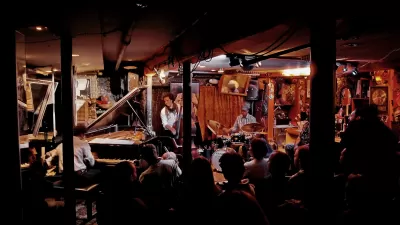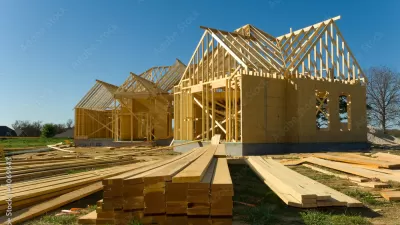A group of venue owners formed in response to the pandemic successfully got a $15 billion support bill passed to help small venues stay afloat during the pandemic.

Writing for Bloomberg CityLab, Rebecca Greenwald reports on the Save Our Stages Act, an initiative started by music venue owners that could help prop up independent venues during pandemic closures. Signed into law on December 27, the $15-billion piece of legislation is an unprecedented show of support for arts and culture—"for context, the National Endowment for Arts has awarded a total of around $5.5 billion since its founding in 1965."
Originally proposed by a newly formed nationwide coalition of music venues, the National Independent Venue Association (NIVA), the Save Our Stages Act recognizes the challenges faced by live entertainment venues, whose expenses to keep shuttered venues alive are putting many of them out of business. Unlike other businesses, federal programs like the Small Business Administration's Paycheck Protection Program don't necessarily help music venues. "The program’s mandate to put the majority of funds towards payroll rather than rent, mortgage, utilities and other overhead costs was completely untenable for businesses that weren’t open or operational," writes Greenwald, citing the average rent for independent venues as ranging between $10,000 and $60,000 per month.
Championed by Minnesota Senator Amy Klobuchar and co-sponsored by Texas Senator John Cornyn, the Save Our Stages Act focuses on "small business and economic recovery" and marks a "momentous occasion" for the NIVA. The group plans to continue its activism after the pandemic and use their newfound political voice to be "a player in Washington."
FULL STORY: How Music Venues Convinced Congress to Save Live Entertainment

Maui's Vacation Rental Debate Turns Ugly
Verbal attacks, misinformation campaigns and fistfights plague a high-stakes debate to convert thousands of vacation rentals into long-term housing.

Planetizen Federal Action Tracker
A weekly monitor of how Trump’s orders and actions are impacting planners and planning in America.

In Urban Planning, AI Prompting Could be the New Design Thinking
Creativity has long been key to great urban design. What if we see AI as our new creative partner?

King County Supportive Housing Program Offers Hope for Unhoused Residents
The county is taking a ‘Housing First’ approach that prioritizes getting people into housing, then offering wraparound supportive services.

Researchers Use AI to Get Clearer Picture of US Housing
Analysts are using artificial intelligence to supercharge their research by allowing them to comb through data faster. Though these AI tools can be error prone, they save time and housing researchers are optimistic about the future.

Making Shared Micromobility More Inclusive
Cities and shared mobility system operators can do more to include people with disabilities in planning and operations, per a new report.
Urban Design for Planners 1: Software Tools
This six-course series explores essential urban design concepts using open source software and equips planners with the tools they need to participate fully in the urban design process.
Planning for Universal Design
Learn the tools for implementing Universal Design in planning regulations.
planning NEXT
Appalachian Highlands Housing Partners
Mpact (founded as Rail~Volution)
City of Camden Redevelopment Agency
City of Astoria
City of Portland
City of Laramie




























